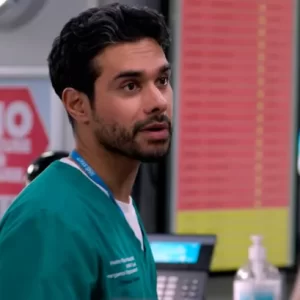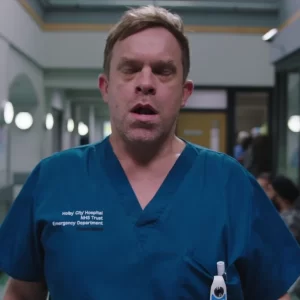As violence erupts in the streets of Holby following the devastating death of schoolgirl Carly Wilson, the emergency department becomes ground zero for the fallout. Leading the charge amidst this unprecedented chaos is newly appointed Clinical Lead, Flynn Byron. Thrust into a volatile situation just weeks into his tenure, Flynn must not only manage the logistical nightmare of a packed ED but also serve as a stabilizing force for a team already pushed to the brink.
From the moment the first casualties begin pouring in—injured protesters, overwhelmed paramedics, and battered officers—Flynn wastes no time springing into action. Donning his red HEMS uniform, he throws himself into frontline care with precision and compassion, immediately gaining the trust and respect of his colleagues. His military background proves invaluable, giving him a unique edge in handling high-pressure scenarios with calm authority.
However, this crisis is more than a medical emergency. It’s a test of ethics, leadership, and humanity. Flynn is forced to juggle complex decisions on resource allocation, triage prioritization, and staff welfare while maintaining composure in a rapidly deteriorating environment. Supplies run low, tempers flare, and the weight of responsibility threatens to crack even the most seasoned professionals—but Flynn remains a constant, rallying the team when it matters most.
Throughout the night, he finds himself at odds with traditional hospital bureaucracy. While others hesitate or become mired in red tape, Flynn pushes for immediate action—calling for external support, advocating for increased security, and demanding accountability from higher-ups. It’s here that his passion for systemic reform takes center stage. He begins questioning the hospital’s overreliance on charitable donations for vital equipment and highlights the urgent need for sustainable funding. For Flynn, this tragedy is not just a one-off emergency—it’s symptomatic of deeper institutional failures.
Behind the scenes, Flynn also shows emotional intelligence, offering support to shaken staff members like Iain and Rida, and ensuring mental health is not overlooked in the midst of physical trauma. His leadership extends beyond the clinical, touching the personal, and reinforcing his vision for a more humane, transparent, and better-equipped emergency department.
By the episode’s end, Flynn has proven himself not just as a competent clinician, but as a leader unafraid to challenge the status quo. His handling of the riot marks a turning point—not only for the ED, but for Flynn himself, as he carves out a legacy defined by bravery, compassion, and a fierce dedication to doing what’s right, no matter the cost.





